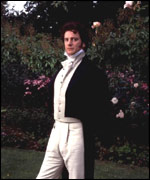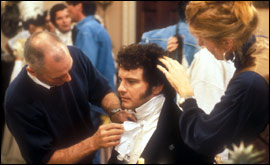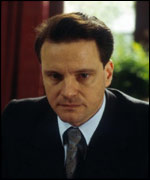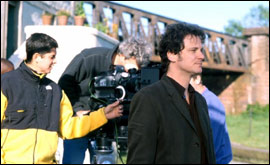Can I ask you about 'Bridget Jones: the Edge of Reason?' When did it start shooting? They've started what they call pre-shooting and we are going into shooting next week.  Is it
true that you agreed to a sequel after Richard Curtis had made some
adjustments to the script? Is it
true that you agreed to a sequel after Richard Curtis had made some
adjustments to the script?No that is not strictly true - certainly nothing specific as that happened. There was something in our contract to do a second film and we did the contract for the first film; it's not an option. But nobody was going to go around forcing anybody to do anything and, if there is any truth in that, it would be that all of us wanted to see the script developed properly. So, no, there was never any opposition taken up that I would not do this. There were just drafts that had been developed over the last couple of years and sent to all of us. Are you worried, because 'Bridget Jones Diary' was so popular and so loved, that the second one won't measure up? There is always a risk, certainly with sequels—they have their own set of problems. I think there is always going to be a slight element of 'they hate you, if you give them the same film' and 'they hate you, if you don't give them the same film'. So there's a bit of 'you're damned if you do, damned if you don't.' You just have got to live with that and work out how to tread the line, which is in the spirit of what people loved about the first one. Just make them feel heard, because they are just getting the same sh*t again. I think people are aware of that. There are always problems, no matter what your circumstances are, when you are making a film and I have to remind myself how much pressure we felt the first time. It wasn't a sequel, but it was the adaptation of an extremely popular book, that almost everybody seemed to get. You can't convert that into film, the nay sayers were everywhere. On the other side, there were people saying, 'It's going to be a hit. You've got a best selling book, Richard Curtis and Hugh Grant—that always works—you have a famous American actress, Working Title, you've even got that 'cute guy' Mr Darcy playing Mr Darcy; it has all the ingredients—perfect.' And I thought 'there's the curse right there'. But it did work… Well, it did, but only because nobody sat back saying 'we have a formula that can't go wrong'. I think people really, really didn't leave it alone until they got it right and that process went on through the cutting and everything. I can see the same happening now, precisely because I think the success of the first film has not made anybody complacent. I think we are all on our toes with where we are going to take it. How do you rate director Richard Curtis, having previously been the writer and then coming on to direct 'Love Actually'? I think it's an extension of the same process with him. I think basically what he is, is a film storyteller. He's written for film; he's watched his work turn into film. He's been very much part of that process, all the way along the line.  He has been constantly consulted through the various
enormous hits that he has produced. It must have been hair-raising for
him to take the job, so I wouldn't underestimate that, but, in some
ways, I felt it was a natural progression for him to properly take the
reins this time. He has been constantly consulted through the various
enormous hits that he has produced. It must have been hair-raising for
him to take the job, so I wouldn't underestimate that, but, in some
ways, I felt it was a natural progression for him to properly take the
reins this time.He's been damn close to the helm before. I am not trying to underestimate what the other directors have done, but I know that people have consulted him. I did a day on a film with him, he wasn't present during 'Bridget', he was on a sabbatical at that time, but he was in touch, going back and forth. I know that he was consulted during the editing process, for his wisdom as much as anything else, when voice-overs were being done. I did a day on a 'BlackAdder' film with Richard and he was sitting there, next to the camera, giving me extra bits of dialogue and cutting bits here and there. So, I didn't feel that I was working with a total novice. What's the deal with London in these films? Do you think it looks like it does in Richard Curtis films? I think that, with London, Richard is writing about what he knows, which I think is a very honest approach really. Some people think that it is sanitised in many ways, but he's not writing social realism about another class than his own. And Jane Austen used to say that she would never write about a class outside her own or even a sex outside of her own. She said that there's no conversation in the whole of Jane Austen between two men alone, because she would never presume to know what men talked about. Everything is squarely from her point of view. I don't know how much I would say that Richard is doing that, but I think he would be, given his sensibility and what he observes. It would be completely pretentious to write about a class or something, because he doesn't pretend to know about that. Part of the reason why he, and people like Nick Hornby, are so successful, is that they stay with, and use, the insights of their life and their world. I think that if you do that honestly, it can have something universal about it. I don't think there is any conscious decision to ethnically cleanse Notting Hill. Well, it does look very clean… It does look cleaned up, yes, but also, if you like romantic comedy, you can go and see Ken Loach films too. There is a lot of edgy stuff around and it is quite interesting that there's actually quite cultivated stuff, particularly in England, amongst cosy little class people who like to disassociate themselves from the cosy little nice films and associate themselves with the Tarantino work, which is fine, but it is just a fantasy. I'm not a fan of the idea that England is a gangster battleground because it is bullsh*t; it is just not. There is a rough side to life, but I mean, Richard's writing about the kind of problems that fairly privileged middle class people have. He's not writing about the social affliction. It seems, in 'Love Actually', that people are not really daring to show each other that they actually fancy one another. Do you think this is something typically British or is it universal? It is certainly not exclusively English, not at all. I think the manufacturers of some of the most expressive music in the world, in the last 40 years, have been English and have been extremely expressive. I know the stereotype you're getting at, but I think that it's not a question about apologetic politeness, which there's an element of in English culture; I think that's slightly outdated.  I think, with giant and chaotic emotions, you don't have
daily language for that stuff; you have people you don't know very well
and to suddenly feel this extraordinary out of control feeling for
somebody - you can't go up to them and say, 'I seem to have developed a
wild passion for you.' I think, with giant and chaotic emotions, you don't have
daily language for that stuff; you have people you don't know very well
and to suddenly feel this extraordinary out of control feeling for
somebody - you can't go up to them and say, 'I seem to have developed a
wild passion for you.'But I think what is quite clever about the title is that it is a juxtaposition between this enormous word 'Love' and this rather indifferent and apologetic British word, 'Actually'. I think there's a lot of comedy in the Englishman who would rather keep his dignity, but really is completely swept away and he has got to express himself. There's a charm in that, which can be made use of, but I certainly think Latin people are just as capable of being tongue tied and embarrassed. To most women around the world, you are the perfect romantic lead. Is that something that you're conscious of? I spend an hour practising on it every morning! (Laughs) So, what makes you good in that kind of romantic leading man situation? I don't dare to go there, really. I just keep to myself and not think about it. Do you ever get star struck when you meet someone and you think 'Oh my God, I can't believe I am talking to this person'? Absolutely, yeah I do it. People whose work I like and that I haven't met before. Anyone in particular? Gosh—it doesn't take much. I think there's magic in watching other people's work, seeing it done well. Alan Rickman, Liam Neeson and Emma Thompson are all people that I hadn't worked with before and who I think have brought me a lot of pleasure, in a lot of different things. I'm impressed, being up close with them, absolutely. 'Love Actually' shows love and separation at the same time. Do you think that they always go together? I do think so, yes. I think it's inevitable. I don't think that's such a tragedy, I think that's partly why people are so afraid of love in a way, because you're vulnerable too. You make yourself very vulnerable, if you care a lot about anything, because there's no guarantee that you can hang on to it. I think that love is inevitability and I think that it is suffering and pain. |

